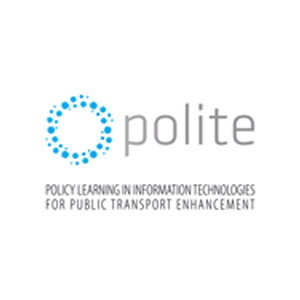
Purposes and tasks
Recent years, Public Transport policies have developed many different services for citizens, such as “infomobility”, which provides travellers with information on the Public Transport services available in their location. However, not all EU regions make use of the same services, which makes it difficult to spread its use at different geographic levels. In this context, POLITE aims to enhance the use of Public Transport by increasing the awareness of infomobility services, providing travellers with adequate and complete information on the choices available.
Documents
News
May 29 2014
POLITE NATIONAL EVENT
POLITE NATIONAL EVENT IN A FRAME OF CONFECENCE “Information and safety – essential service aspects affecting public transport attractiveness: theory and practice”
Transport and Telecommunication Institute
1, Lomonosova str., Riga Latvia
June 4, 2014
October 17 2013
Latvian first dissemination event
Each technical partner of POLITE project has to organize two national events to inform the local audience and stakeholders about the project news and achievements. This country-based approach overcomes the language barriers often encountered in European projects. The Riga national event also acts as transmitter from European to national level and complements the European dissemination efforts undertaken by the project partners. These event is organised to present project results in parallel with Component 3 achievements (event will present the best practices analysis). This event aim at fostering the transfer of POLITE achievements to the wider local/regional public and at feeding the partners’ joint work at EU level by collecting stakeholders’ concerns.
The national event aim to meet the following objectives:
- Giving the audience an insight into POLITE and the good practices that partners will exchange
- Raising awareness among local and national public administrations and decision-makers about existing different infomobility solutions around Europe, and in particular in the respective site/country
- Understanding better the context for applying infomobility services in the respective countries
- Promoting co-modality and the wider use of public transport
- Raising interest in the POLITE project and its outcomes, and motivating participants to follow the project and also attend the 2nd local event in 2014





June 21 2013
POLITE met for a Good Practice Round Table in Reading, UK
The POLITE project partners have identified 31 EU proven good practices in public transport information systems for exchange coming both from the consortium and from external non-project sites. The project partners have been busy the past months with meetings, interviews and site visits to the non-project sites in order to select the ones that would best match the needs and interests of the project partners. A number of good practices have been identified in the UK, Italy, Czech Republic, Spain, Latvia, Poland, Belgium, Denmark. The good practices identified go even beyond the borders of the EU countries to Switzerland, Croatia and Serbia. The Good Practice Round Table held in Reading on 14-16 May, was a milestone in the project as the partners performed a good practice analysis in order to identify those good practices which best meet their policy requirements. Two methods were used to define the good practices to be used in POLITE. On the one hand, a methodology proposed by LaTDEA according to which each best practice is defined into one of 5 key areas: Public Transport and/or Multimodal Information Systems; Public Transport Fleet Management Systems; Public Transport Interchanges; Public Transport Payment Systems; and Public Transport Priority Systems. On the other hand, an initial prioritizing of the Good Practices was done by the partners. After the final analysis of this information, a report will be produced including a collection of the good practices. The list of good practices will also be made available on the POLITE website.
A site visit in Reading, who is leading the component on exchange of experiences, also took place. It covered three main areas: the public transport priority, access controls and enforcement; the station redevelopment and interchange design; and Reading traffic control centre.






February 13 2013
Intervija ar AS “Rīgas starptautiskā autoosta” valdes priekšsēdētāju Vairu Gromuli
September 27 2012
2nd Consortium Meeting in Riga, Latvia
Wednesday 26th September 2012
All day Arrival of participants
Thursday 27th September 2012 – Morning session
09.30 Registration of participants
10.00 Opening of the meeting: greetings and welcoming by the lead and hosting partners (LP Calabria Region and PP LaTDEA)
10.30 Component 1: presentation of the 1st semester progress/financial report, activities undertaken and next steps (LP Calabria Region)
11.30 Coffee break
12.00 Component 2: activities undertaken and next steps (PP Polis & ILIM)
13:00 Lunch
14.30 Component 3: activities undertaken and next steps (PP RBC, PoF and CDV) with a special focus on implementation of site visits
16.30 AOB / Coffee break
17:00 Conclusion and endorsement of any relevant decision by SC (all PPs)
17.30 Visit of Riga
20.00 Dinner
Friday 28th September 2012
All day Departure of participants














June 21 2012
The kick-off meeting
All the partners were represented and the work on the project has commenced.
The two day meeting agenda included presentations on the administrative issues of the project, financial guidelines and reporting practices as well as technical presentations by all partners.
POLITE partners will work together in the exchange and transfer of experiences and improvement on policies, knowledge & good practices on infomobility services in their regions, with the goal of improving their public transport information systems. In addition, POLITE plans to establish links with other experienced regions from outside the partnership, offering support for bilateral exchange on selected infomobility topics.






